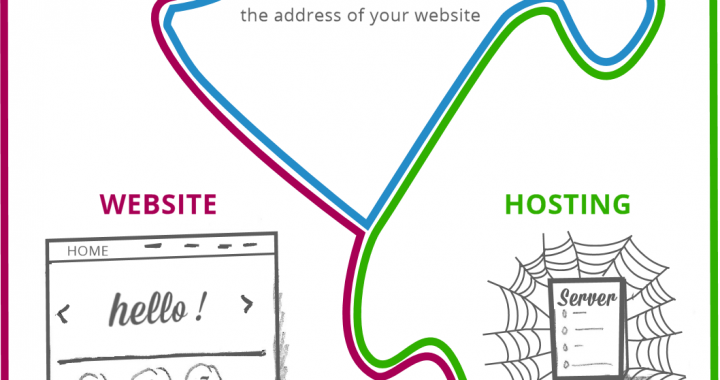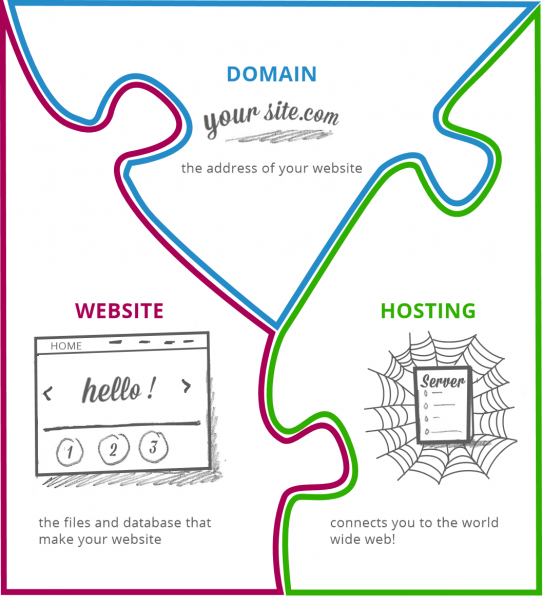Should you buy your website hosting and domain with the same internet service provider?
This is a good question for the person who is about to register their website address, or if your web designer offers to register a domain and host your website too.
In this article I am going to give you the pros and cons of buying your domain and website hosting from the same company, or from a web designer. I hope to protect you from costly errors and help you avoid paying more than you need when you buy a domain and hosting packages.
Firstly if you are about to choose a new domain, please a take a look at my article What Domains Do I Need? This contains advice on what to check before you choose your domain, and what extras you might want to purchase at the same time.
Please explain! What is a domain, what is hosting and why do I need them?
I am asked this frequently. If you know this already, jump to the ten things you need to know here.
In order to get a website onto the internet, you need three parts of a jigsaw puzzle.
1. a domain
This is the address of your website, also known as your URL, which for the geeky amongst us, stands for uniform resource locator! But enough of that. It is like your mobile phone number: you want to have one, and you want it to stay the same for as long as you need it. You want it to be portable when you get a new phone or when you switch service provider. The same goes for your website domain: it should be easily portable if you change websites or hosting providers.
2. a website
These are the files (and database) that put together make your website appear on a computer screen. You can have a website on your local computer at home, but nobody would see it unless it is hosted publicly and has an address. It is like your mobile phone. You can hold it in your hand, but it’s not useful until you have a telelphone number and a network provider.
3. website hosting
This is like your mobile phone network service provider. It connects your website to the world. It is the ‘place’ your website files and database must be saved and the ‘place’ your domain URL must point to. There are a few choices as to what service level you might need. For a starter website usually a shared cloud hosting package is sufficient. If you have want super-fast hosting, have high visitor numbers or peaks of traffic, or you are unsure about a shared service due to security concerns, you may choose a dedicated server. The latter is naturally more expensive.
Ten things to understand before you register your domain
It is likely that the company you register a new domain with may offer you lots of seemingly attractive extras, including website and email hosting. But should you buy them all together or keep them separate? And should you accept an offer from your web designer to register a domain for you?
1. It it essential that your domain is in your control
The golden rule! When you buy a domain, you need to make sure that it is registered in your name, or your company name. This domain needs to be within your control as it may be a significant business and branding asset.
2. Be careful if your website agency registers your domain for you
I would recommend that you register your own domain – there are instructions on how here – and don’t get the agency building your website to do that. Most website designers and developers are absolutely trustworthy, but they will probably put your domain in with a lot of others in a company account, so you won’t have your own access to it.
Importantly, there may be occasions where relationships break down, or you lose contact. Certainly, you don’t want to find that the person you’re in a dispute with can actually control what appears on your website because they control your domain.
3. The risk of losing contact and the nightmare sabotage
Fairly often I am asked to help rescue a website which the client cannot access because they do not have hosting access or domain access either. This can be a time-consuming process to resolve. I have also experienced the ‘designer with a grudge’, who pleasantly grafittied my new client’s existing website during the domain ‘Transfer out’ process. We were helpless at that time to stop him.
4. The freedom to move supplier
Similarly, if you want to move to a new website designer or support, having control over your domain will seriously ease the process of switching to a new supplier. This is because you can simply change the place the website address points to, without having to deal with a potentially disgruntled incumbent supplier.
5. The pain of reclaiming a domain that is rightfully yours
If the worst comes to the worst, domain sellers and regulators have procedures for you to claim a domain name that is rightfully yours, but it’s a process to be avoided. If you have a .uk domain, Nominet is the regsitry organisation that can help you retrieve access to your domain.
6. “But”, you say, “I would rather someone else did this for me!”
If you are not confident, or very busy, it’s certainly easier to delegate this task, so if you’re not too concerned about control and your website designer does register the domain for you, then please ask them to register it in a new account with your details, so you at least have your own login.
7. How many years do you want to register it for?
It may seem cheap to see your domain is only 99p, but be aware that it is usually only the first year that is such a low price. When you add your domain choices to your basket, beware that the company you’re buying from may add a 2-year or a 3-year registration. Usually there’s a bulk saving buying more years, but only if you need then. Simply buy one year if you don’t.
8. Remember VAT
Another tricky practice for us common consumers to look for is that, like car garages, domain sellers tend to put on the VAT at the end of the bill, not in the initial price quoted. That can push your total up somewhat!
9. To bundle or not to bundle
Usually a web host and domain seller bundle their products, so you might see a free domain if you buy hosting at the same time.
The pros: it’s usually a good price to buy both together. You’ll only have one login and one company billing you.
The cons are really about security.
The main thing is that if you buy your website hosting and domain with one provider and your hosting account is hacked, there’s potential for the hacker to not only gain control of your website, they may also be able to control your domain name. That can leave you with a big problem. At the very least, make sure you practise good password security on your hosting account.
Keep them separate and if somebody hacks your website they cannot get hold of your domain as it’s somewhere else. Similarly if you fall out with your web host, you can ditch them much more quickly as your domain is somewhere else. As mentioned, it’s much more easy to port your website across to another host than it is to try and get hold of a website that is in somebody else’s hands.
10. What about email hosting?
You’re likely to want an email address using the same address as your website. I’ve written another article about where you host your email here.
11. Search Engine Optimisation packages and other marketing tools.
My view is that you can save this for later. It’s not something you’ll need until you’ve got a website up and running, so I’d put this one hold when you register a domain.
In summary
I hope this article answers any questions you may have about whether you should buy domain and hosting with the same provider. There are no hard and fast rules, just please remember that your domain is to be protected. Please ask any question in the comments below, or ping me an email using our contact form.

